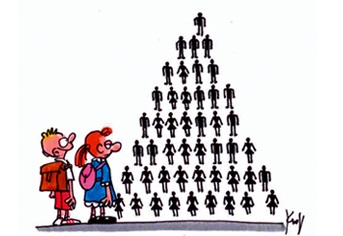Council of the EU calls on Member States to reduce horizontal gender segregation in education and labour market
Published:
On 7 December 2017, the Council of the EU adopted Council Conclusions on Enhanced measures to reduce horizontal gender segregation in education and employment. The Conclusions are based on the report ‘Gender segregation in education, training, and the labour market’ prepared by the European Institute for Gender Equality (EIGE) at the request of the Estonian Presidency of the Council of the EU. ETUCE had an opportunity to review and contribute to the EIGE report before it was presented to the Council.
The Council Conclusions point out that even though across the EU countries, women generally have better educational outcomes than men, they remain over-represented in labour market sectors that have low socio-economic status and low pay, such as education, health and welfare jobs. The Council recognizes that under-evaluation of the work in care and education areas, organisational differences related to working time, unequal sharing of domestic and care responsibilities between women and men, and gender stereotypes in the society, negatively influence the education and career choices of women and men in Europe.
To address the problem of gender segregation in education and labour market, the Council calls on the Member States to develop and implement ‘integrated, sustainable, and multi-dimensional policies’ for bringing the structural change to the problem. It demands to raise awareness among teachers, parents, counselors and other persons involved in education, on causes and various expressions of gender inequality, as well as on possible measures to address it. The Conclusions call on Member States and the European Commission to take concrete steps to address the problem of early school leaving, promote lifelong learning possibilities for men and women of all ages to change their career, introduce well-designed work-life balance measures, and provide quality, affordable and accessible care facilities for children and other dependents.
ETUCE welcomes the Council Conclusions and highlights the fact that the Conclusions demand from the European Commission to hold regular exchanges with the European social partners on the issues of gender segregation in education. However, ETUCE reminds that in order to attract more men to professions with a high percentage of women workers such as teaching, Member States have to provide education personnel with competitive salaries and appealing opportunities for career progression and professional development.